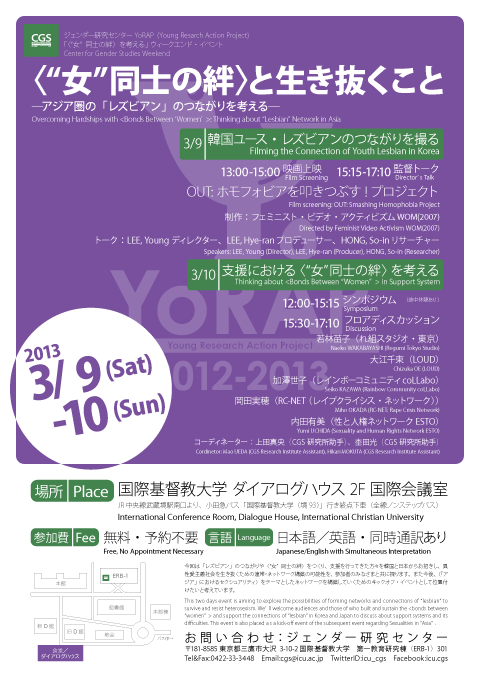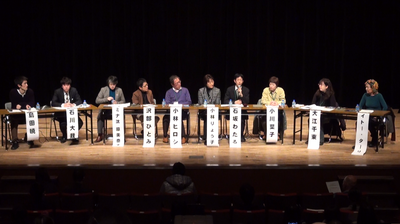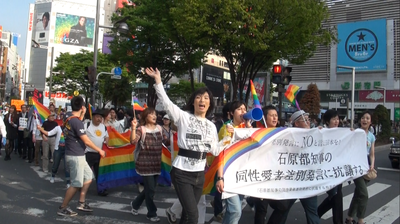Date:
9th March, 2013 (Sat)
10th March, 2013 (Sun)
Place: International Conference Room, Dialogue House, International Christian University
Language: Japanese/English with Simultaneous Interpretation
Free, No Appointment Necessary
Hosted by Center for Gender Studies YoRAP2012-2013
Cordinator: Mao UEDA (CGS Research Institute Assistant), Hikari MOKUTA(CGS Research Institute Assistant)
This two day event will explore the possibilities of forming "lesbian" networks and connections to survive and resist heterosexism. We welcome all those who have built and continue to sustain the 〈bonds between "women"〉 and support the connections of "lesbians" in Korea and Japan to discuss support systems and their difficulties. This event will also kick-off the subsequent event, "Sexualities in 'Asia'."
Day 1: Filming the Connection of Youth Lesbian in Korea
9th March, 2013 (Sat) 13:00-17:10 (Doors open at 12:30)
13:00-15:00 Film Screening
15:15-17:10 Director's Talk
Film screening: "OUT: Smashing Homophobia Project"
directed by Feminist Video Activism WOM(2007)
Speakers: LEE, Young (Director), LEE, Hye-ran (Producer), HONG, So-in (Researcher)
The film "OUT: Smashing Homophobia Project" (2007) is about lesbian youth in Korea, and it depicts how they struggle with and confront the issues of homophobia and being a "lesbian." After the screening, we'll invite three people from Feminist Video Activism WOM to talk about the background of the filming, as well as the situations and the struggles of youth lesbians, lesbian activism, and supporting systems in Korea, and how those projects, activism and supporting systems help to create "lesbian" empowerment.
Day 2: Thinking about 〈Bonds Between "Women"〉 in Support System
10th March, 2013 (Sun) 12:30-17:40 (Doors open at 12:00)
12:30-15:15 Symposium
15:30-17:10 Floor Discussion
Speakers:
Naeko WAKABAYASHI (Regumi Studio Tokyo)
Chizuka OE (LOUD)
Seiko KAZAWA (Rainbow Community coLLabo)
Miho OKADA (RC-NET: Rape Crisis Network)
Yumi UCHIDA (Sexuality and Human Rights Network ESTO)
Three lesbian communities were founded in a different period of time. The first half of the event, we'll discuss how each community has defined "lesbian" and "woman," and what it means to be a "lesbian" living in this society. The second half of the event, we'll welcome Miho OKADA and Yumi UCHIDA and discuss about the issues of being a sexual minority in such situations, as the Great Eastern Japan Earthquake, domestic violence, rape, and inaccessibility to the resources particularly about the information on their survival.



